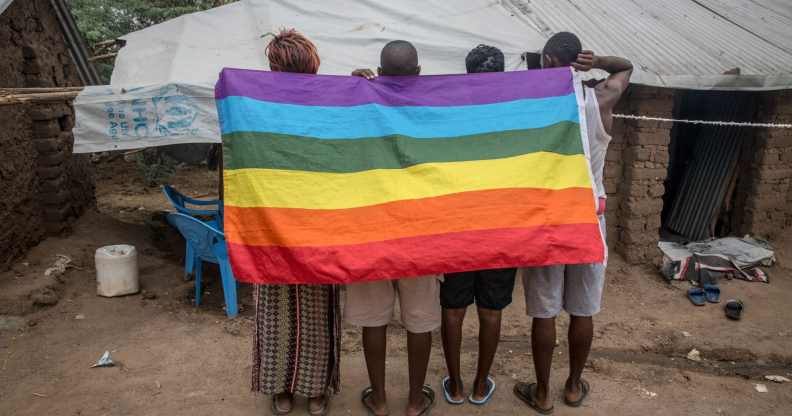Netherlands uncovers shady criminal network that helps Ugandan asylum seekers pretend to be LGBT+

Ugandan LGBT+ refugees pose in a protected section of Kakuma refugee camp in northwest Kenya. (Sally Hayden/SOPA Images/LightRocket via Getty)
The Dutch government in the Netherlands has uncovered a secret criminal network that was helping Ugandan asylum seekers to pretend to be LGBT+.
According to Reuters, the Dutch Immigration and Naturalisation Service (IND) said it had discovered that an organised group was offering asylum seekers from Uganda documents and “training” on how to pretend to be LGBT+ for the price of around 2,500 euros.
The Dutch government will now have to reassess the cases of many Ugandans who were granted asylum in the Netherlands on the basis of them being LGBT+. It has already reviewed the cases of around 250 refugees, 36 of which could be fraudulent.
But this now means that genuinely queer people from Uganda seeking refuge in the Netherlands will face harsher assessment measures.
In a report, the IND said: “These findings have led to a more critical assessment of visa applications stemming from Uganda.”
Sandro Kortekaas, chairman of the Dutch charity LGBT Asylum Support, said: “What I think is really bad is that now a whole group of people, regardless of whether they are believable or not, is now deemed untrustworthy.”
A spokesperson for Dutch LGBT+ rights group COC Nederland also warned that stricter assessments may complicate an already difficult process for queer asylum seekers from Uganda.
They said: “You are asking someone from a different country and culture who has never spoken to anyone about their sexual identity to tell their story about how they became aware of their sexual orientation.
“I can imagine that they want to be well-prepared for these kinds of questions. This does not mean that they aren’t lesbian, gay, bisexual or transgender.”
The Netherlands has accepted queer asylum seekers from Uganda since 2014, when the African country briefly brought in the death penalty as punishment for gay sex.
Gay sex is currently punishable by life in prison in Uganda, same-sex marriage is banned by the constitution and LGBT+ people face violence and discrimination in their daily lives.

